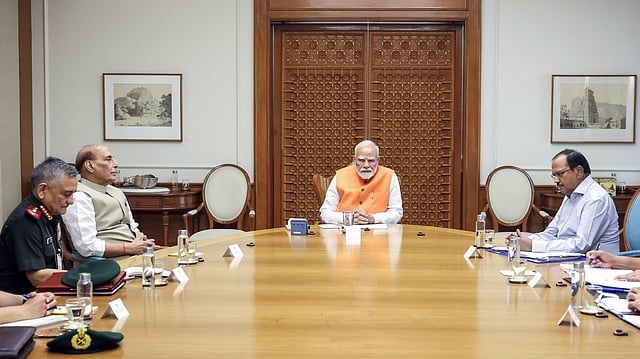 Prime Minister Narendra Modi (C) chaired a meeting with Defence Minister Rajnath Singh (L), National Security Advisor Ajit Doval (R) and the military top brass. New Delhi, April 29, 2025
Prime Minister Narendra Modi (C) chaired a meeting with Defence Minister Rajnath Singh (L), National Security Advisor Ajit Doval (R) and the military top brass. New Delhi, April 29, 2025
Photo: Indian Punchine
In a timely reminder, even as Indians are demanding robust retaliation for the terrorist attack in Pahalgam in Kashmir, the US president Donald Trump pulled aside Prime Minister Narendra Modi to signal that conversations with India on a trade pact were “coming along great” and announced that the two countries “will have a deal on tariffs.”
If there could be a gentle reminder about India’s national priorities at this point in time, this is it, stresses M.K. Bhadrakumar, Indian Ambassador and prominent international observer.
Trump has a way of conveying what words and cliches cannot spell out when it comes to war and peace. It is just as well that Modi may have responded by deciding that much as India’s resolve to deal a crushing blow to terrorism should never be in doubt, “the complete operational freedom to decide on the mode, targets and timing of the response” shall rest with the armed forces.
The PM reportedly expressed complete faith and confidence in the professional abilities of the armed forces. It is a historic decision by any elected government in power in a democracy by any reckoning.
Interestingly, Modi revealed his decision at an exclusive meeting that was attended by Defence Minister Rajnath Singh and the national security advisor Ajit Doval (who is also known to be doubling up as the tsar of India’s covert operations abroad) as well as the top brass.
From all indications, it is entirely conceivable that the government is weighing military options to target Pakistan after the April 22 terror attack. Pakistan seems to sense it, too. Tensions are spiralling along what used to be the Line of Control (LOC) up until this week, which itself is fast dissolving as Pakistan has decided to hold in abeyance all bilateral treaties with India including Simla Agreement in response to Delhi’s moves on the diplomatic track.
The international reaction so far, as Trump’s latest remark testifies, shies away from endorsing the war option. Simply put, no country, including our time-tested friend Russia or the so-called Global South, has any understanding for the sentiments expressed in India favouring military action against Pakistan. On the other hand, China has taken an exceptionally supportive position underwriting Pakistan’s sovereignty and security.
Put differently, as Bhagwat underscored by drawing inspiration from our ancient epics, India is arrogating to itself the moral prerogative to deploy its military strength in a “visible” manner in an external environment in the thermonuclear age amidst highly complicated geopolitical manoeuvring by the big powers and the international community, which, again, is transitioning from one world order to another that is struggling to be born.
Make no mistake, this is going to be hugely consequential going forward. Pakistan, in fact, has warned the international community that any military moves by India shall be “responded to assuredly and decisively… onus of any escalatory spiral and its consequences shall squarely lie with India.” Implicit in the statement is a veiled threat that even a nuclear threshold may be reached if push comes to shove.
Taking into account the totality of the emergent situation, Pakistan is unlikely to bend. It keeps insisting that it is also a victim of terrorism originating from India. And it has openly hinted that it will not hesitate to climb the escalatory ladder in the event of any Indian offensive. Suffice to say, unless India opts for the Russian course of a war of attrition spread over years, which is simply out of the question, a rapid escalation could be in the cards.
Therein lies the rub: How to de-escalate when (not if) the needs arises? Arguably, India still has a closed mind in mediation by third parties even in the radically changed post-cold war international setting.
On the other hand, India has only a tenuous communication link with Pakistan, which, presumably, remains open still — the channel between the two Directors-General of Military Operations. Howsoever tenuous the link is, at a time when emotions are running high on both sides, some thought should be given to keep it open — and, importantly, not to hesitate to use it. After all, the two militaries have a long history of being sensible, realistic, pragmatic adversaries who understand each other.
Sometimes, countries that behave like lotus eaters leading a life of dreamy, indolent ease, need a rude awakening. If this is one such moment, then, the death of 26 Indians wouldn’t be in vain.
read more in our Telegram-channel https://t.me/The_International_Affairs

 10:50 01.05.2025 •
10:50 01.05.2025 •






















